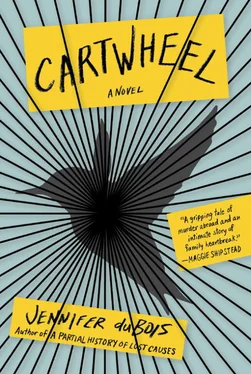“Well,” said Katy. “I guess we don’t really know that much about them.”
Lily went over to the mansion the next afternoon, right after classes ended. The path to the house was overgrown with some kind of scrubby grass that looked potentially poisonous. The knocker was heavy and shaped like the head of a mythical beast that Lily couldn’t identify. She stood back a few feet away from the door and waited for the rich boy, he of the perpetual darkness, to emerge.
The door opened, and an implausibly young-looking person appeared. His eyes were beautiful in an obnoxious sort of way, and he had freckles, which made him seem tremendously unserious.
“Hi,” said Lily in Spanish. “I’m Lily. I’m staying next door with the Carrizos, and I’m supposed to invite you over for dinner.”
“Are you?” The boy answered in English. It was flat, American English, not the vaguely British kind that most people who learned English as a second language seemed to sport (as if it weren’t enough to speak a second language fluently, you had to speak the classier version, too). “Well, go ahead then.”
“You’re invited for dinner,” said Lily dumbly.
“What a delightful surprise.”
Those eyes! You got annoyed at him just for having them. Lily knew that it was technically her turn to speak again. “I didn’t know anyone lived here,” she said.
“Well, someone does. After a fashion.”
In addition to being beautiful, the boy’s eyes were extremely, outlandishly tired. Lily was not sure she’d ever seen a young person look as exhausted as this boy; everything he said seemed all the more impressive because he appeared to be on the verge of narcolepsy or coma. Lily wanted to be rude to him, a little, just to wake him up. “How old are you?” she demanded.
“One never asks a lady her age. How old are you?”
“Twenty. You live here by yourself?”
He mimed looking around. “It would seem so.”
“How long have you lived here?”
“Excuse me, how long have you lived here?”
“You speak English very well.”
“Yours is tolerable.”
Suddenly, Lily felt exhausted, too; you couldn’t talk to someone who wanted to win every single piece of dialogue. Maybe that’s why he looked that way; the horrendous drain of being the funniest person in the room, in every room, in this enormous horrifying house. “Seven o’clock, tomorrow,” she said. “If you want.”
January
The house next door had been dark like Sebastien’s until the Carrizos moved in. They came in March, during his second year alone, though he tried never to think about those years in term of years. When the Carrizos came, the evenings got brighter, and Sebastien sat watching their yellow kitchen lights and the soft blinkered hysteria of their television; the house was ablaze, like a forest fire on a hill. People don’t think about how much you can see through a window at night in a house that’s very well lit—this was not why Sebastien kept his so dark, though it was certainly an auxiliary benefit. He tried not to stare at the Carrizos’ house once they moved in. But it was impossible sometimes not to gaze a little longingly at all that light.
Sometimes he imagined that they could see him, too. This fantasy kept him busy and decent, dressed, up at reasonable hours, engaged in activities that were arguably fruitful. He had employed a similar strategy toward his parents, back when they were recently dead and he was first learning how to live this way. He’d imagined that they were watching him—stern, censorious, though not entirely without sympathy for his plight—and this had saved him, he was sure, to the extent that he could be said to have been saved at all. He realized he was inventing gods for himself—false gods, at that—but he also knew he was not above it. Though he hoped to take the secret to his grave, he really was a pragmatist at heart. And it could be argued that pretend-believing in the occasional surveillance of the neighbors—the indubitably literal neighbors, with their gleaming car and their showy appliances and their honorable recycling habits—was marginally healthier than pretend-believing in the constant surveillance of ghosts. At any rate, it seemed to have some of the same salutary effects. In the backyard, Sebastien grew flowers, effeminate hobby though it was. On the Internet, he watched his investments go up and down; he followed every twitch and flutter of the New York Stock Exchange, and London, and Tokyo; he was a compulsive reader of the news. It was not impossible, after all, to still be witness to the world. He played online poker, too, which would be a vice, he knew, for a person with less money and time. As it was, both money and time were abstract curses, and Sebastien could not reproach himself much for a habit that squandered either of them.
He thought often of selling the things. The house was overrun with expensive and oppressive objects—his mother’s jewelry, his father’s antique weapons, all manner of treasures plundered from all corners of the globe—and it would not have been hard to get rid of them. He could have sold them online—Sebastien vacillated between an intense solitude-compounded agoraphobia and a loneliness so clawing and vast that it was like vertigo—and he could have donated the proceeds, of course. (He could not bear the thought of acquiring any more money; he’d never live long enough, or have enough of a populated life, to spend what he had already, and this felt like a particular brand of bitter reproach in a newly capitalist society.) But somehow he never got around to it, just like he never got around to going over to the Carrizos’ house and introducing himself. The objects kept sitting there, accruing talismanic qualities and dust, and Sebastien himself kept sitting there, accruing only dust.
In spite of his close observation of the Carrizos, the arrival of Katy and Lily was a surprise—and perhaps it was the fact of the surprise that moved Sebastien more than the girls themselves, at first. Though he’d barely met the Carrizos, he had not expected them to make any sudden moves; he’d known when they were going to buy the new car, for example, and he had not been shocked when the rumors emerged of Carlos’s shady business dealings (you had to only look at the man’s leisurely hours and unlikely acquisition of exponentially more expensive household goods to know that something was amiss). But the girls—one light haired and delicate, as lovingly formed as a deer, the other pale and inquisitive looking in a way Sebastien rather liked—were a mystery. Were they far-flung—and hopefully wayward—young cousins? But then, they looked too different to be related, and their closeness in age could not be entirely coincidental. They were foreigners, it was clear, though they were both lacking the slouchy sexuality of the European girls he had known; they were attractive, but there was a frankness and—he thought at first, before he knew them both and before he loved one of them—a kind of dumbness to their beauty: It was so sincere, so unreconstructed, so unapologetic. It was being subverted by nothing. It was just there, flapping about in the wind, like a flag.
Basic questioning of the women at Pan y Vino bodega revealed that the girls were Katy Kellers and Lily Hayes—what a fussy, old-fashioned, Edith Whartonish name that was!—and that they were study-abroad students from the States. Sebastien watched them for a few days—their comings and goings, their outings, and occasionally, though not often, their evenings—against the shining backdrop of their breathtakingly well-lit house. He found himself continuing to like Lily the better of the two, though not for her appearance, particularly. She was pretty enough—with reddish hair and high-arched eyebrows that made her look extremely wide-awake—but pretty girls were like flowers: astonishing and utterly common, both. Instead, what drew him to Lily was what appeared, at least from a distance, to be her strange solitude—a solitude much less complete but, he had to assume, far more elective, than his own.
Читать дальше












